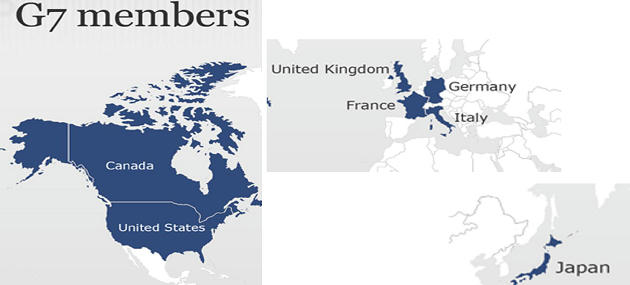Table of Contents
WHY THESE GROUPS?
- These groups have been formed to tackle the global problems. Like- terrorism, climate change, financing etc.
- They play crucial role in balancing those problems.
- These groups also have the biggest economies of the world.
G7- GROUP OF SEVEN
- G7 is a collective of seven of the world’s most industrialized and developed economies.
- G7 was formed initially to discuss economic and political concerns prompted by the 1973 oil crisis.
- Its 1st summit was held at Rambouillet, France, in 1975.

- Leading export countries
- Largest gold reserves
- Largest nuclear energy producers
- Top contributors to the UN budget
INTERNATIONAL ORGANISATIONS INVITED BY G7
- International Monetary Fund
- World Bank
- United Nations
- World Trade Organization
- African Union
- International Energy Agency
- Other nations have also been invited to participate from time to time.

G7 & G8
- Both the G7 and G8 are same groups.
- Initially it was made by six members as G6- Italy, Japan, France, Germany, UK and USA.
- In 1976, Canada
- Russia joined the group from 1998 but it was fragmented out from the group in 2014 after annexation of Crimea.
- Today, the G7 are reckoned as the 7 wealthiest and most advanced nations in the world.
- All G7 countries have a per capita GNI of more than $40,000.
- It is way more than the $12,056 per capita GNI required to be labelled a high-income country.
- G7 countries also collectively comprise 65% of the global G04D-06-2P020 — at almost $40 trillion.


- Calling the existing Group of Seven (G-7) club a “very outdated group of countries”, US President Donald Trump said on Saturday that-
- He wanted to include India, Russia, South Korea, and Australia in the group;
- Although it was unclear whether he wanted the expansion or to be permanent.
- SO WHAT DOES US PRESIDENT DONALD TRUMP’S PITCH FOR INCLUSION OF INDIA INTO G7 MEAN FOR INDIA’S INTERESTS?
REDUCING IMPORTANCE OF G7
- The rise of India, China, and Brazil over the past few decades has reduced the G-7’s relevance, whose share in global GDP has now fallen to around 40%.
- Together, the G-20 countries make up around 80% of the world’s economy.
- Joining G7 may not be in India’s best interests.
- That’s because for one, G7, at its very basic, has been a grouping of the richest, most industrialised nations, with the per capita income ranging from a little over $34,000 (for Italy) to almost $63,000 (for the US).
- India’s per capita income at a little over $2,000 places it in the ranks of lower middle income
TRUMP’S TRAP?
- Becoming a G7 member could also bolster Trump’s often repeated grouse that India doesn’t deserve the developing country tag.
- Earlier this year, the US, ahead of Trump’s visit to
- India, removed it from the list of developing countries citing its G20 membership & a share of more than 5% of global trade.
- India’s share stands at 67% of global exports and 2.57% of imports.
- The removal of developing nation tag by the US has also impeded the negotiation of a trade deal between the two countries — it was expected to be signed during Trump’s visit.
- As a developing country, India got duty concessions worth $240 million in 2018.
MORE POLITICS IN G20
- Unlike the G20, which is more focused on economic issues, the G7’s focus is more on political issues —
- Case in point, Trump’s pitch for G7’s expansion does not include China, the world’s second largest economy and which isn’t really a surprise given his frosty relationship with Beijing.
- A G7 membership could potentially open the doors to commentary on India’s domestic politics and bilateral relations, such as on Kashmir.
REDUNDANT OFFER?
- India, along with the US, is already a member of the G20, which is a far more representative club of global economy.
- That makes joining G7 obsolete — a view expressed even by Trump who labelled the grouping “outdated”.
- India may also need to remind itself that the G7 at the current juncture is a house divided, with the US pitted against the remaining six countries — UK, Canada, Germany, Italy, France and Japan — and which may not serve India’s own interests well.

Latest Burning Issues | Free PDF






















 WhatsApp
WhatsApp